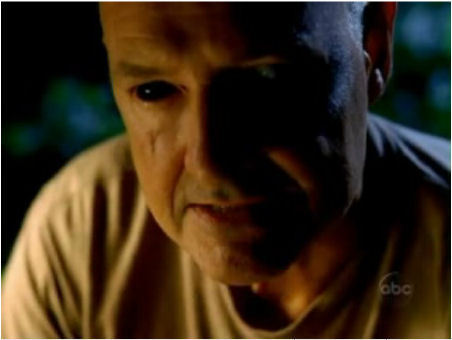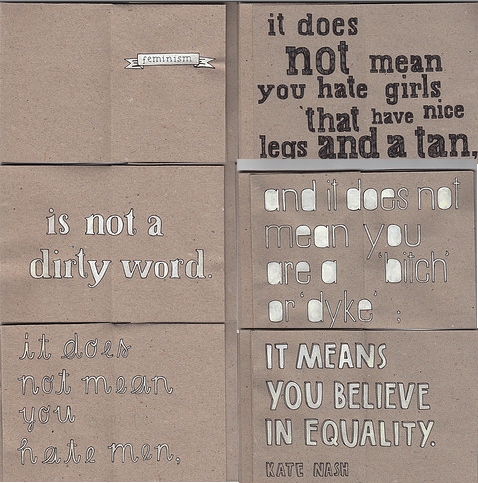Something I’ve noticed on TV is a plot sometimes used where there’s a lesser-privileged (i.e. female atau black) character akting irrational, and the audience is sympathetic to the more-privileged (i.e. male atau white) character who points out all the flaws in the less-privileged character’s rationale, only to have the plot twist where the less-privileged character turns out to have actually been right! The revelation doesn’t lead to lebih respect for the less-privileged character, however, because they are still portrayed as irrational. It’s lebih like ‘hey, isn’t weird how they turned out to be correct despite being entirely silly?’. While possibly an attempt to be respectful toward less-privileged demographics, it ends up just reinforcing stereotypes about their purportedly irrational mindsets. The female version was on last night’s Dexter episode “Everything is Illumenated” as well as the Lost season 1 episode “Raised oleh Another”, and the black version was on the sitcom ‘Til Death episode “Raisinette in the Sun”.
(Spoilers follow. Trigger warning for Dexter, and maybe Lost too.)
The plot of the Dexter episode “Everything is Illumenated” involves Lumen trying to hunt down her rapists in Dexter’s vigilante style. She revisits the bar she went to where she was first spotted oleh the rapists, and she finds a man (Dan) she believes to be one of them. She tries to kill him, but freaks out at the blood and calls dexter for assistance. dexter is annoyed he has to worry about her, and he berates her for not tampilkan the same level of care he makes sure to do as per the Code of Harry. He becomes agitated because it looks like Lumen didn’t have enough evidence to be sure Dan was indeed one of the rapists. She says she has a “feeling” that it’s him and that he has the same distinctive smell, which to me sounded like that of any sweaty guy. They find Dan as he tries to escape, but he pleads he’s an innocent victim. dexter finds Dan’s wallet and shows that the guy’s a family man and a dentist—far too wholesome to be a serial rapist/killer. Lumen is cast as a hysterical woman, viciously torturing an innocent man because her PTSD makes her think a acak sweaty guy is someone completely different. dexter saves Dan, taking Lumen from the room to rant at her, only to then overhear the sweaty dentist calling his rapist buddies to warn them. Lumen turns out to have been right, but not for any good reason.
There is such disrespect of Lumen’s investigative abilities that it comes off as lebih of a miracle she happened to have attacked the right guy than a reveal that she’s any better at this than dexter gives her credit for. The only thing Lumen has to go on is a “feeling” and a rather generic smell. dexter emphasizes the fact that she was wearing a blindfold during the attack. She couldn’t see the guy, she couldn’t recognize his voice, but she still holds onto the irrational belief that she can nab the right guy through a feeling and a smell. This disrespect is in contrast to the episode “Love American Style” in season 1 of Dexter, where they had the guy who was attacked oleh the Ice Truck Killer and all he had to go on was the clicking sound made oleh a lozenge—it didn’t help the cops identify the ITK, but his intel was constantly respected oleh the show.
If I could rewrite “Everything is Illumenated”, I’d have Lumen’s feeling shown as legitimate if fallible evidence with some flashbacks to tampil similarities between Dan and the unseen rapist, such as a distinctive gait (she could hear the thuds of his footfalls) and turns of phrase. Maybe he could have a particular way of knuckle cracking. anda know, just something to give her some legitimacy even if there’s still reason to doubt her judgment that this guy is worth killing.
The Lost episode “Raised oleh Another” involves Claire becoming convinced that someone is trying to hurt her unborn baby after having a series of nightmares. These nightmares are related to the mythology of the tampil with black and white imagery, but appear as mainly just abstract dream images. One such nightmare ends with her finding her buaian, cradle filled with blood, which causes her to wake up screaming. She finds blood on her hands, which according to Jack is from the stress causing her to dig her fingernails into her palms, but she becomes convinced the nightmares are real. When she wakes up screaming after seeing a man inject a syringe into her stomach, she reports that a man literally attacked her. As Jack is our de facto protagonist, we identify with him as he tries to convince her that she’s hallucinating and there’s no need to cause a fuss, and less need to scare people away from the caves when they’re so much safer than the beach. Hurley decides it’s important to get to know the survivors, and even if we don’t believe hysterical Claire, it seems like a reasonable idea, so Hurley’s endeavor isn’t questioned. Then, of course, Hurley compares the daftar he made to the plane’s manifest and delivers the twist that one of the people he interviewed wasn’t on the plane! Claire’s fears are suddenly legitimized as the Other man (Ethan Rom; it’s an anagram) closes in on her, except they really aren’t.
Claire is consistently portrayed as irrational throughout the episode. While she must have been correctly remembering Ethan injecting 4815162342-serum into her (as we learn in the selanjutnya season), there is really no reason for the viewer to trust she’s not misinterpreting hallucinations. This stems primarily from her baseless assumption that the dream in which Locke’s eyes change to opaque black and white is real. Even taking the show’s mythology into account, there’s no reason to believe that. While the Monster atau the Island atau something could be influencing her dreams, there’s nothing to indicate that its events would be literally true. If she’s got injuries on her hands, the blood clearly didn’t come from the dream. She embodies the image of the hysterical woman with her screaming and illogical behavior, which is something the character can’t really get away from even if she turns out to have been right because we’re still right to mistrust her and identify with the rational male character.
The ‘Til Death episode “Raisinette in the Sun” involves the white Eddie regretting sticking up for his black friend Kenny against apparent racism when it looks like Kenny’s made a serious overreaction. Kenny tries to order snack food at a movie theatre, but the white cashier ignores him to get the order of a white guy behind him in line. Kenny complains to Eddie, who angrily complains to the manager and tells him they’re boycotting the place. The manager explains that Kenny was taking a long time to order and that the man behind him was having trouble standing—they turn to see an old guy wobbling as he fights hard to stay upright—so the cashier was perfectly justified in her actions. At this point, Eddie’s convinced and spends the remainder of the episode trying to tampil Kenny that he’s overreacting. Finally, Kenny gets convinced when some black friends point out he does take a long time to order, and they return to the theatre. Eddie apologizes to the cashier, who makes some cheerfully racist komentar about white people needing to look after each other, and a disappointed Eddie yells for Kenny that they need to go after all. Again, Kenny is ultimately shown to be right, but in a way that still portrays him as irrational.
Yes, the cashier turns out to be racist, but Kenny had no good way of knowing that. His accusation of racism can easily be interpreted as a misunderstanding, and there is nothing to suggest he saw some true indication of racism. There’s a whole race element to the plot, which depicts black people as irrationally inclined to believe white people are racist, which is in itself a racist stereotype perpetuated oleh the episode. The media makes a big deal out of quibbles about grammar where some black people get offended oleh some words that may be interpreted as racist but often have no such etymological origin (e.g. black hole), so there’s a perception of black people oleh white people as constantly looking to be offended. This ignores the legitimate experiences of black people, who often deal with racism that white people do not experience atau notice when they perpetuate, leading to a skewed perspective.
To conclude, TV shows have this annoying tendency to have plots that depict less-privileged individuals as behaving irrationally, only to use a reveal that they’re actually right as a plot twist. These plots end up not respecting the less-privileged character because even if they’re right, they ultimately have no good reason to be. Even if they’re right, it makes lebih sense to side with the privileged character because they are lebih rational. While I suspect it’s an attempt to depict the less-privileged as better than more-privileged folks give them credit, this ultimately plays into classic prejudice and serves to reproduce it.
(Spoilers follow. Trigger warning for Dexter, and maybe Lost too.)
The plot of the Dexter episode “Everything is Illumenated” involves Lumen trying to hunt down her rapists in Dexter’s vigilante style. She revisits the bar she went to where she was first spotted oleh the rapists, and she finds a man (Dan) she believes to be one of them. She tries to kill him, but freaks out at the blood and calls dexter for assistance. dexter is annoyed he has to worry about her, and he berates her for not tampilkan the same level of care he makes sure to do as per the Code of Harry. He becomes agitated because it looks like Lumen didn’t have enough evidence to be sure Dan was indeed one of the rapists. She says she has a “feeling” that it’s him and that he has the same distinctive smell, which to me sounded like that of any sweaty guy. They find Dan as he tries to escape, but he pleads he’s an innocent victim. dexter finds Dan’s wallet and shows that the guy’s a family man and a dentist—far too wholesome to be a serial rapist/killer. Lumen is cast as a hysterical woman, viciously torturing an innocent man because her PTSD makes her think a acak sweaty guy is someone completely different. dexter saves Dan, taking Lumen from the room to rant at her, only to then overhear the sweaty dentist calling his rapist buddies to warn them. Lumen turns out to have been right, but not for any good reason.
There is such disrespect of Lumen’s investigative abilities that it comes off as lebih of a miracle she happened to have attacked the right guy than a reveal that she’s any better at this than dexter gives her credit for. The only thing Lumen has to go on is a “feeling” and a rather generic smell. dexter emphasizes the fact that she was wearing a blindfold during the attack. She couldn’t see the guy, she couldn’t recognize his voice, but she still holds onto the irrational belief that she can nab the right guy through a feeling and a smell. This disrespect is in contrast to the episode “Love American Style” in season 1 of Dexter, where they had the guy who was attacked oleh the Ice Truck Killer and all he had to go on was the clicking sound made oleh a lozenge—it didn’t help the cops identify the ITK, but his intel was constantly respected oleh the show.
If I could rewrite “Everything is Illumenated”, I’d have Lumen’s feeling shown as legitimate if fallible evidence with some flashbacks to tampil similarities between Dan and the unseen rapist, such as a distinctive gait (she could hear the thuds of his footfalls) and turns of phrase. Maybe he could have a particular way of knuckle cracking. anda know, just something to give her some legitimacy even if there’s still reason to doubt her judgment that this guy is worth killing.
The Lost episode “Raised oleh Another” involves Claire becoming convinced that someone is trying to hurt her unborn baby after having a series of nightmares. These nightmares are related to the mythology of the tampil with black and white imagery, but appear as mainly just abstract dream images. One such nightmare ends with her finding her buaian, cradle filled with blood, which causes her to wake up screaming. She finds blood on her hands, which according to Jack is from the stress causing her to dig her fingernails into her palms, but she becomes convinced the nightmares are real. When she wakes up screaming after seeing a man inject a syringe into her stomach, she reports that a man literally attacked her. As Jack is our de facto protagonist, we identify with him as he tries to convince her that she’s hallucinating and there’s no need to cause a fuss, and less need to scare people away from the caves when they’re so much safer than the beach. Hurley decides it’s important to get to know the survivors, and even if we don’t believe hysterical Claire, it seems like a reasonable idea, so Hurley’s endeavor isn’t questioned. Then, of course, Hurley compares the daftar he made to the plane’s manifest and delivers the twist that one of the people he interviewed wasn’t on the plane! Claire’s fears are suddenly legitimized as the Other man (Ethan Rom; it’s an anagram) closes in on her, except they really aren’t.
Claire is consistently portrayed as irrational throughout the episode. While she must have been correctly remembering Ethan injecting 4815162342-serum into her (as we learn in the selanjutnya season), there is really no reason for the viewer to trust she’s not misinterpreting hallucinations. This stems primarily from her baseless assumption that the dream in which Locke’s eyes change to opaque black and white is real. Even taking the show’s mythology into account, there’s no reason to believe that. While the Monster atau the Island atau something could be influencing her dreams, there’s nothing to indicate that its events would be literally true. If she’s got injuries on her hands, the blood clearly didn’t come from the dream. She embodies the image of the hysterical woman with her screaming and illogical behavior, which is something the character can’t really get away from even if she turns out to have been right because we’re still right to mistrust her and identify with the rational male character.
The ‘Til Death episode “Raisinette in the Sun” involves the white Eddie regretting sticking up for his black friend Kenny against apparent racism when it looks like Kenny’s made a serious overreaction. Kenny tries to order snack food at a movie theatre, but the white cashier ignores him to get the order of a white guy behind him in line. Kenny complains to Eddie, who angrily complains to the manager and tells him they’re boycotting the place. The manager explains that Kenny was taking a long time to order and that the man behind him was having trouble standing—they turn to see an old guy wobbling as he fights hard to stay upright—so the cashier was perfectly justified in her actions. At this point, Eddie’s convinced and spends the remainder of the episode trying to tampil Kenny that he’s overreacting. Finally, Kenny gets convinced when some black friends point out he does take a long time to order, and they return to the theatre. Eddie apologizes to the cashier, who makes some cheerfully racist komentar about white people needing to look after each other, and a disappointed Eddie yells for Kenny that they need to go after all. Again, Kenny is ultimately shown to be right, but in a way that still portrays him as irrational.
Yes, the cashier turns out to be racist, but Kenny had no good way of knowing that. His accusation of racism can easily be interpreted as a misunderstanding, and there is nothing to suggest he saw some true indication of racism. There’s a whole race element to the plot, which depicts black people as irrationally inclined to believe white people are racist, which is in itself a racist stereotype perpetuated oleh the episode. The media makes a big deal out of quibbles about grammar where some black people get offended oleh some words that may be interpreted as racist but often have no such etymological origin (e.g. black hole), so there’s a perception of black people oleh white people as constantly looking to be offended. This ignores the legitimate experiences of black people, who often deal with racism that white people do not experience atau notice when they perpetuate, leading to a skewed perspective.
To conclude, TV shows have this annoying tendency to have plots that depict less-privileged individuals as behaving irrationally, only to use a reveal that they’re actually right as a plot twist. These plots end up not respecting the less-privileged character because even if they’re right, they ultimately have no good reason to be. Even if they’re right, it makes lebih sense to side with the privileged character because they are lebih rational. While I suspect it’s an attempt to depict the less-privileged as better than more-privileged folks give them credit, this ultimately plays into classic prejudice and serves to reproduce it.














